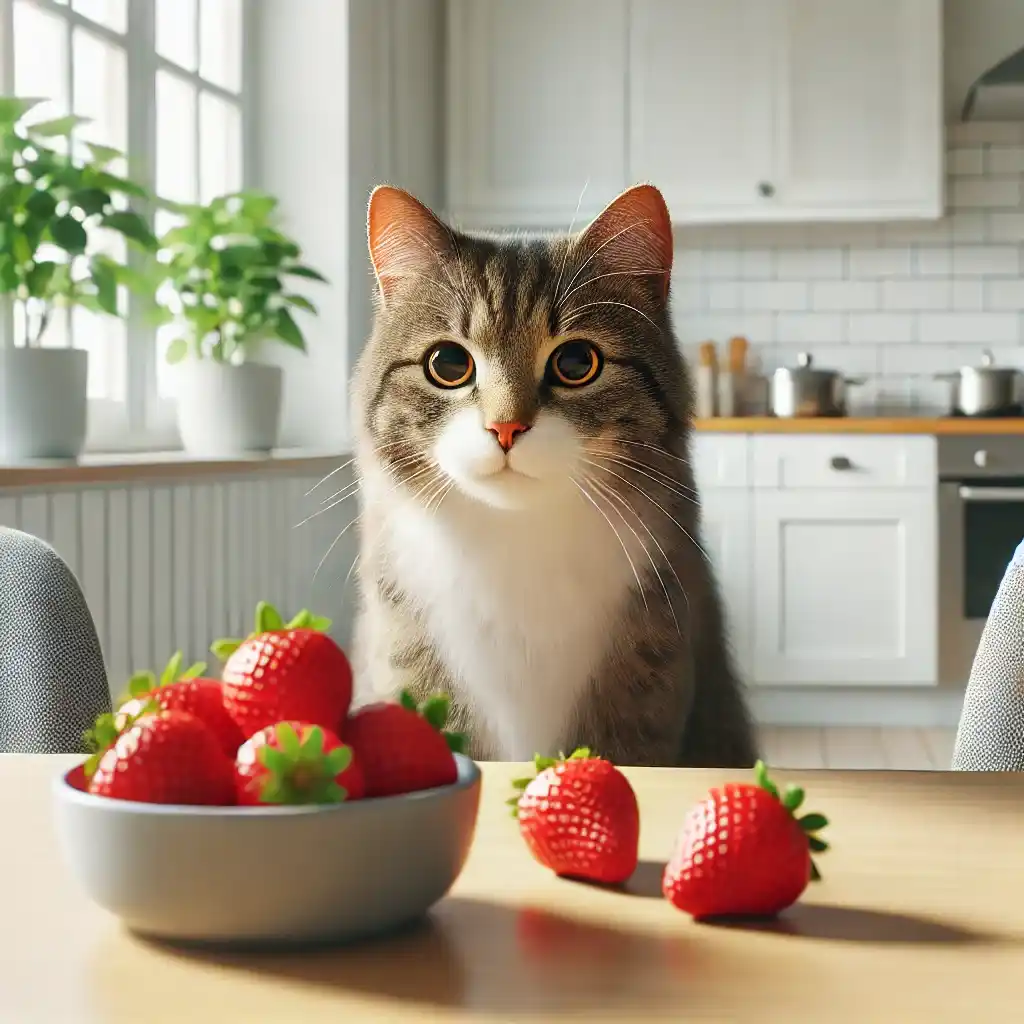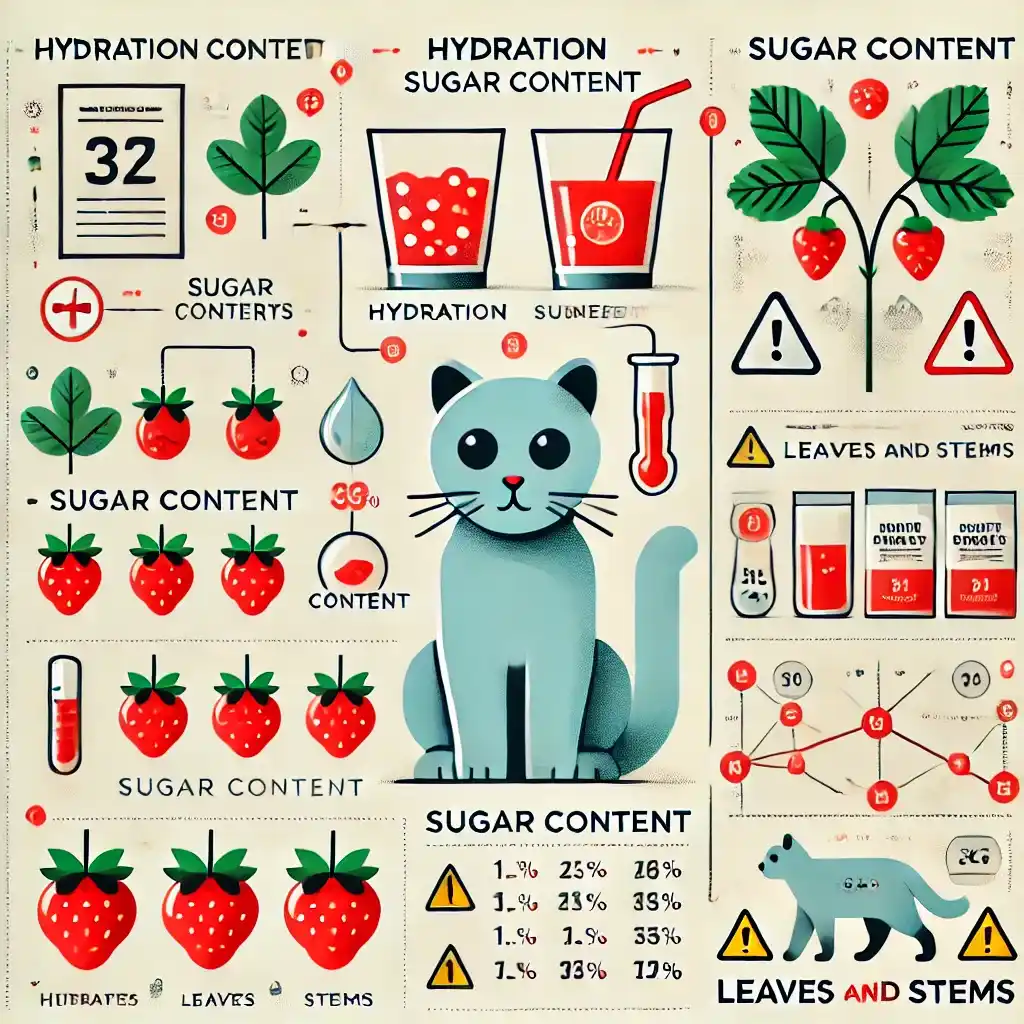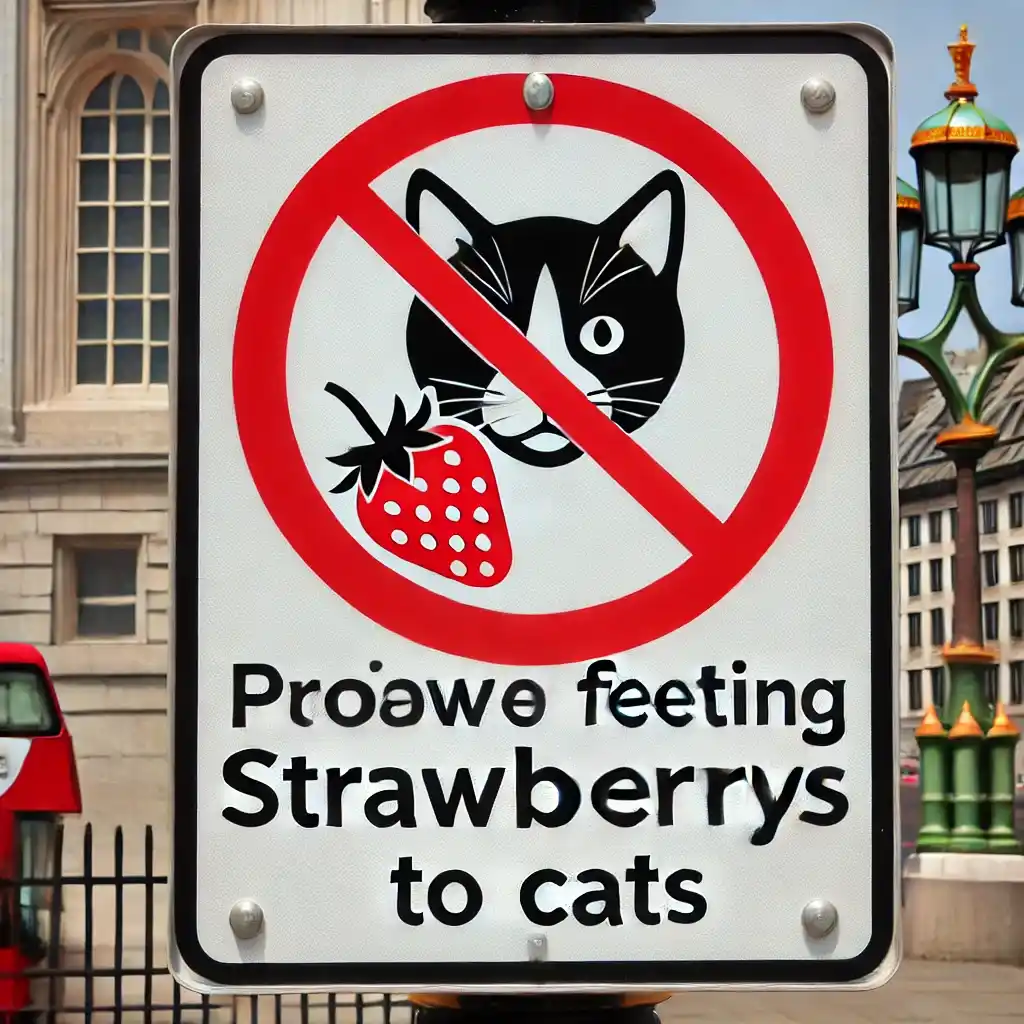Can Cats Eat Strawberries is a common question for pet owners curious about sharing their favorite fruits with their feline friends. While strawberries are non-toxic to cats, they are not a necessary part of a cat’s diet. In this article, we’ll explore the safety, benefits, risks, and proper ways to feed strawberries to cats.
read it: are these sundance anthuriums poisonous to cats?
Can Cats Eat Strawberries?
Yes, cats can eat strawberries in moderation. According to The Spruce Pets, strawberries are considered safe and non-toxic to cats. However, due to their high sugar content, they should not be a regular part of your cat’s diet. An occasional strawberry is acceptable for most healthy cats.
Nutritional Value of Strawberries for Cats
Strawberries are rich in vitamins and antioxidants, including Vitamin C, folate, and potassium. However, these nutrients are not essential for cats since their diets already meet their needs through high-quality cat food. While strawberries can provide hydration due to their high water content, they don’t contribute significantly to a cat’s overall nutrition.
read it: it safe to bring a unvaccinated cat inside?
Potential Benefits and Risks of Feeding Strawberries to Cats
Benefits:
- Hydration: Strawberries contain about 90% water, helping to keep your cat hydrated.
- Mental Enrichment: Offering new, safe foods can provide stimulation and variety.
- Low Calorie: Strawberries are a low-calorie treat compared to other human foods.
Risks:
- High Sugar Content: Excessive sugar can lead to obesity and diabetes in cats.
- Digestive Upset: Some cats may experience vomiting or diarrhea after eating strawberries.
- Allergic Reactions: Although rare, some cats may show signs of allergies, including itching or swelling.
read it: Why do cats lick you?
How to Safely Feed Strawberries to Your Cat
- Wash Thoroughly: Remove pesticides or dirt by washing the strawberries carefully.
- Remove Stems and Leaves: These parts are tough to digest and could cause gastrointestinal issues.
- Cut into Small Pieces: Slice the strawberry into cat-friendly, bite-sized pieces to prevent choking.
- Offer in Moderation: Limit the portion to a small slice occasionally to avoid overloading your cat with sugar.
- Monitor for Reactions: Always watch for adverse effects, especially when introducing strawberries for the first time.
read it: Can Cats Eat Chocolate?
What Happens If a Cat Eats Strawberries?
If your cat eats strawberries, it’s typically not harmful. Most cats tolerate small amounts without issues. However, overindulgence could lead to digestive upset, such as vomiting or diarrhea. If your cat eats a large quantity of strawberries or shows signs of discomfort, consult your veterinarian for guidance.
What Happens If a Cat Doesn’t Eat Strawberries?
Cats are obligate carnivores, meaning their primary dietary requirement is meat. If your cat doesn’t eat strawberries, there’s no need to worry. Their regular cat food provides all the essential nutrients they need for optimal health. Strawberries are an optional treat, not a dietary necessity.
What to Do If a Cat Eats Strawberries and Has a Problem
If your cat shows symptoms like vomiting, diarrhea, or allergic reactions after eating strawberries, take the following steps:
- Stop Feeding Strawberries: Immediately discontinue offering strawberries.
- Monitor Symptoms: Watch for any worsening signs of illness.
- Contact a Veterinarian: Provide details about the amount of strawberries consumed and the symptoms observed.
Table: Can Cats Eat Strawberries?
| Question | Answer |
|---|---|
| Can Cats Eat Strawberries? | Yes, in moderation and properly prepared. |
| Are Strawberries Beneficial? | They provide hydration but no essential nutrients for cats. |
| Risks of Eating Strawberries? | High sugar, potential digestive upset, and rare allergic reactions. |
| How to Serve? | Wash, remove stems and leaves, and cut into small pieces. |
| What If a Problem Occurs? | Stop feeding, monitor symptoms, and contact a veterinarian. |
Related Questions About Can Cats Eat Strawberries
Can Kittens Eat Strawberries?
No, kittens have sensitive digestive systems and should avoid strawberries until they are older.
Are Strawberry Leaves Safe for Cats?
No, leaves and stems can cause digestive issues and should always be removed before serving.
Can Cats Eat Strawberry-Flavored Treats?
Avoid giving cats strawberry-flavored products as they may contain artificial sweeteners like xylitol, which is toxic.
How Many Strawberries Can a Cat Eat?
One small slice of strawberry occasionally is sufficient. Avoid overfeeding due to the high sugar content.
Can Diabetic Cats Eat Strawberries?
No, diabetic cats should avoid strawberries because of their natural sugar content.
Why Do Some Cats Like Strawberries?
Cats lack sweet taste receptors, so their interest is likely due to the texture or curiosity rather than the flavor.
Can Cats Eat Dried Strawberries?
No, dried strawberries are more concentrated in sugar and should not be given to cats.
Can Strawberries Cause Allergies in Cats?
While rare, allergic reactions are possible. Monitor your cat for itching, swelling, or other signs of allergies.
Are There Other Fruits Cats Can Eat?
Yes, fruits like blueberries and bananas are safe in moderation. Always research before introducing new foods.
Do Strawberries Improve a Cat’s Health?
Strawberries don’t provide essential health benefits to cats. They are purely a treat and not a dietary requirement.
Conclusion
So, can cats eat strawberries? Yes, they can, but only in moderation and as an occasional treat. While strawberries are safe and non-toxic, they offer little nutritional value for cats and should never replace a balanced feline diet. Always prepare strawberries carefully and monitor your cat for any adverse reactions. By understanding your cat’s dietary needs, you can ensure their health and happiness while safely sharing occasional treats.




